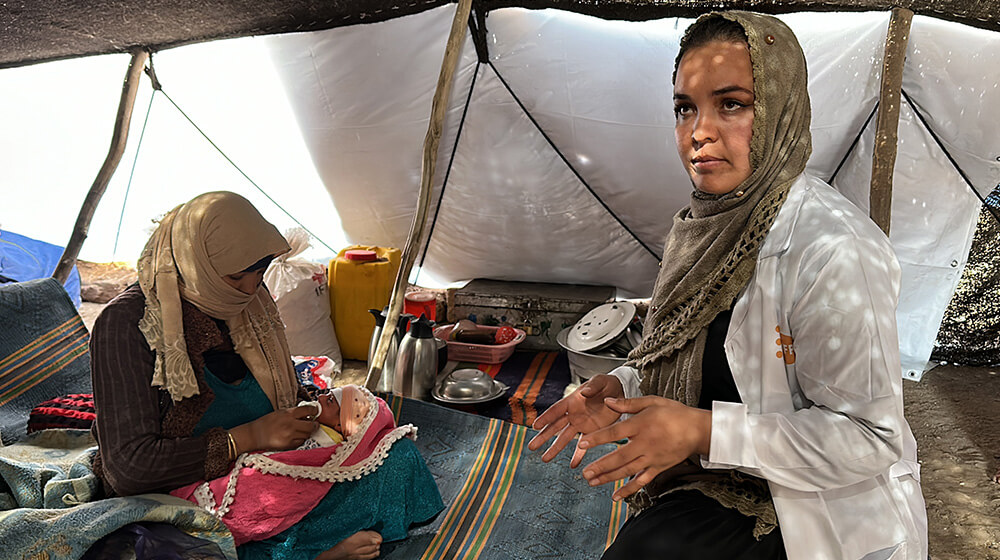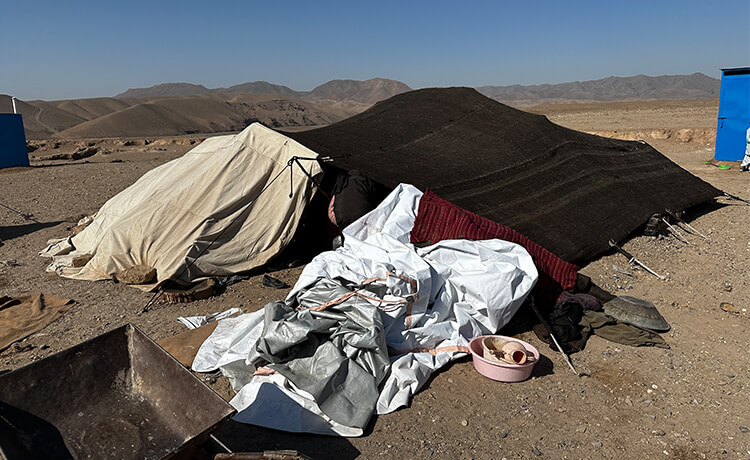
Early in the morning on 15 October, 20-year-old Hanifa felt them: The contractions that signalled her baby was on its way.
The timing was less than ideal. Just one week prior, a 6.3-magnitude earthquake had rocked Herat Province, Afghanistan, reducing Hanifa’s home and thousands of others to rubble. Displaced and sheltering in a canvas tent, Hanifa felt lost and hopeless.
“I thought, ‘How can a mother bring a child into this chaos?’” she told UNFPA, the UN sexual and reproductive health agency. “But then Rahna, the midwife, arrived like an angel.”
Childbirth during displacement can be dangerous. Pregnant women who have been forced from their homes are more vulnerable to violence, malnutrition and disease. And they are likelier to give birth without the support of a skilled health-care worker, raising the risk of life-threatening complications.
Fortunately for Hanifa, Rahna, a UNFPA-supported midwife, was on hand to help guide her through labour and bring her baby safely into the world. “She held my hand, and her words were like a soothing balm for my fears,” Hanifa said. “I went from panic to comfort in moments.”
Solace personified
In the aftermath of catastrophe, addressing the sexual and reproductive health needs of women and girls often takes a backseat to other urgent humanitarian priorities.
But “women do not stop getting pregnant and giving birth” when crisis strikes, UNFPA Executive Director Dr. Natalia Kanem has said. And they face potentially deadly risks amid disasters due to a lack of access to health care services before, during and after childbirth.
Midwives are critical to combating these challenges. According to UNFPA, they can cover about 90 per cent of the global need for interventions across sexual, reproductive, maternal, newborn and adolescent health; yet the world under-invests in their development, putting millions of lives at risk.
To fill the gap, UNFPA trains and supports midwives around the globe and, when necessary, dispatches them to emergencies. Rahna is one of eight midwives that UNFPA sent to Herat as part of a contingent of five mobile health teams, which have been offering medical care, psychosocial support, and sexual and reproductive health services to those affected by the quake.

Relief and joy
Hanifa’s labour lasted six hours, and during that time, her blood pressure spiked. High blood pressure is a leading cause of maternal mortality, despite being largely preventable and treatable.
Quality health care is essential to navigating this danger, and fortunately, Rahna’s skilled support enabled both Hanifa and her newborn to survive.
“It was a challenging situation, but when I saw the relief on Hanifa’s face as she held her baby, I felt a profound sense of pride,” Rahna said. “I was able to save not just one life but two – the baby and Hanifa.
Hanifa named her baby boy Ahmad. “In the midst of disaster, we brought a glimmer of hope, and that’s a feeling I’ll carry with me forever,” Rahna said.